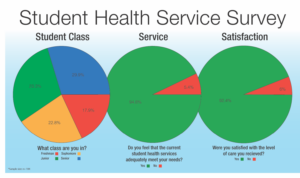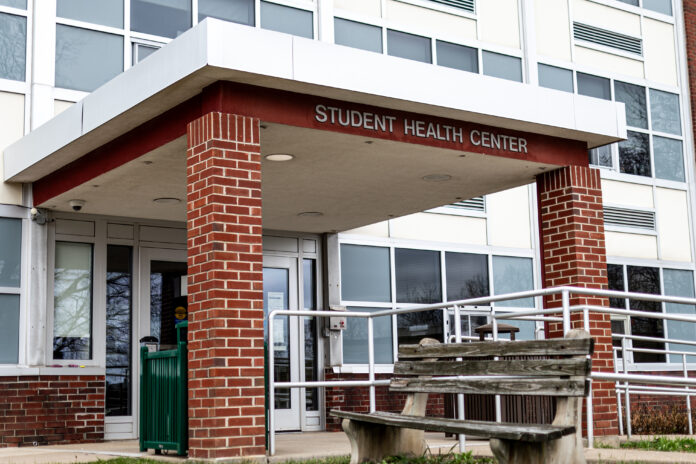The Slippery Rock University Student Health Services (SHS) will be exploring options to address consistent financial concerns.
Early in the Fall 2023 semester, a committee sanctioned by Chief Student Affairs Officer David Wilmes was formed and tasked with proposing recommendations to find a solution to fix the 2022-23 $190,032 deficit facing SHS. The committee is named the Future of Student Health Services.
On Sept. 7, 2023, the Future of Student Health Services Committee met for the first time. The committee met for 12 meetings from Sept. 7 to Nov. 27. The committee had six members.
Christine Karshin, dean of the College of Health Professions – Chair
Michele Crytzer, chairperson of the Nursing Department
Kris Benkeser, director of SHS
Karla Fonner, dean of students
Ken Messina, director of Counseling Services
Cara Kriebel, director of Financial Planning and Analysis
The purpose of this committee was to “examine the current clinical offerings and staff patterns of the Student Health Center, examine student health care needs and make recommendations for the future,” according to the official committee report from December 2023.
Along with this, the committee was asked to identify and provide a model of services to best support students while also being financially stable.
The committee began to look at data from the SHS and other sources to best decide how to tackle the goals at hand. From SHS data, they analyzed services provided, services sought by SRU students and the current staffing plan. Service data included both visits and referrals.
They also observed budget expenditures and deficits, current levels of student satisfaction of existing services and student health trends from the American College Health Association National College Health Assessment Survey III.
Along with this research, the committee gathered further information via an anonymous SHS employee Qualtrics survey. Medical and administrative support staff had the chance to fill out the survey.
The survey’s purpose was to gather employee input on topics such as current and potential student health care needs and the resources required to meet those needs. The survey also asked for recommendations to create a “sustainable, affordable, comprehensive framework” that would support the health of students and the campus community.
The final question of the survey asked respondents to best describe their position in the SHS. Options to choose from were registered nurse (RN), nurse practitioner (NP), health promotion and administrative support.
Committee takeaways
The committee proposed seven recommendations for the future of SHS, immediately stating that “the committee does not recommend the 100% outsourcing of clinical health services provided to students,” according to the December 2023 committee report.
“This could be a costly endeavor that has not yielded favorable results for some of our sister institutions.” The Rocket reached out to 27 colleges in Pennsylvania. Eight of these schools utilize outsourced student health service models.
Clarion University, Kutztown University, East Stroudsburg University, Bucknell University, Allegheny College, Gettysburg College, Shippensburg University and Cedar Crest College were among the eight schools that chose to outsource.
According to the committee report, they believed shifting personnel and associated costs would lead to a balanced budget.
“The FY2022-23 deficit in SHS was approximately $200,000, which included $80,000 for an Associate Director of Student Support. SHS is no longer paying for this personnel expense, beginning in FY2023-24.”
According to the committee’s final report, the budget gap (without the $80,000) of $120,000 “could be balanced with the reduction in any combination of approximately $30,000 from BOOST and Health Promotion.”
The committee recommended the expansion of mental health services provided by SHS. In doing so, this would mean reclassifying a 10.5-month RN position into that of a 9-month NP.
A current SHS RN passed her boards to become a certified behavioral health NP. Per the committee’s final report, they felt strongly in transitioning that RN into the role of Behavioral Health NP and eliminating the vacated RN position.
“This staff member [a Behavioral Health NP] would be certified to test for ADHD, handle post-hospital medicine management, prescribe medication, consult with the counseling center staff and other referred providers, as well as provide family care services when needed.”
In December 2023, the SHS saw a vacancy in an RN position due to a resignation. The committee recommended not filling this position. This resignation, coupled with the recommendation position transition, would total five vacant RN positions in the SHS.
According to the final report, a thorough examination of services provided by BOOST, HOPE and the Health Promotion Office should take place.
“The committee recommends that a thorough review of these services take place to identify possible duplication of services, and to reduce programming costs.”
According to the committee’s final report, if costs should be reduced because of the recommended review, programming expenses from BOOST or Health Promotions could move to the Student Life Enhancement Fund.
The committee recommended a blended service model that would allow the SHS to continue to provide critical services.
“We recommend shifting focus of care to an urgent care facility that focuses on access to care for the most pressing issues, and referral to local health systems/practitioners or use of primary care providers at home to help manage more chronic conditions.”
Per the committee’s research, the top three reasons students visit SHS are for services related to upper respiratory infections, mental health services and sexual health concerns.
The committee’s findings showed a significant percentage of SRU students received medical care from their primary care providers at home. The committee also considered medical conditions that require the supervision of medical specialists.
This approach would allow for the continued care of students for acute medical needs and could be accommodated with a smaller SHS staff.
Statement from OPEIU
The Rocket reached out to OPEIU’s (Office and Professional Employees International Union) labor representative, Anthony Lazzari.
Lazzari was present on campus on Feb. 27 for a meeting with Wilmes, Chief HR Officer Holly McCoy, Labor Relations Specialist Brad Henry and Benkeser.
Lazzari gave a statement regarding the current situation.
“Slippery Rock University administration is currently evaluating the most effective way to serve our students at the Student Health Center, ensuring both effectiveness and financial sustainability,” the union stated. “This assessment will include consideration for the full outsourcing of clinical health services.”
“The healthcare professionals currently employed at the Student Health Center firmly believe that our students deserve continuity and quality of care from trusted professionals, rather than unfamiliar faces. This belief is not merely a stance; it is deeply rooted. We are committed to ensuring that our students are not subjected to uncertainty by entrusting their care to strangers. Our nurses are dedicated to providing our students with the care they deserve from the people they trust most.”
Accreditation Association for Ambulatory Health Care
The SHS voluntarily participates in an accreditation process through Accreditation Association of Ambulatory Health Care (AAAHC).
This accreditation is nationally recognized and is a testament to the standard of quality health care services being provided.
“Accreditation demands a high level of commitment and effort. It challenges us always to find better ways to serve you. It reminds us constantly that our first and most important responsibility is to see that you receive the best care we can possibly provide,” the Student Health Services website states.
The Rocket reached out to the AAAHC inquiring about the official standing of the SHS provided at SRU. AAAHC provided the following statement.
“McLachlan Student Health Services at Slippery Rock University have a reported mission to provide quality health care and to promote an optimal level of health and wellness among the student body.”
“The center has continued to achieve accreditation from AAAHC since 1998. The organization satisfies accreditation requirements, demonstrating its commitment to high quality care and patient safety for Ambulatory Accreditation.”
“Accreditation reflects the dedication of McLachlan Student Health Services to high quality patient health care, and this organization stands among an elite force that prioritizes quality for patients and staff through primary care.”
Student survey results and interviews
The Rocket administered a survey sent through social media and to each SRU college for distribution. The goal of the survey was to gauge student satisfaction with SRU health services and the overall opinion on the outsourcing SHS.
About 180 students responded, yielding extremely positive results towards the level of service the SHS currently provides.
The survey had a fair representation of class rank with respondents being 28% seniors, 30% juniors, 23% sophomores and 18% freshmen.
Ninety-four percent of overall respondents indicated use of SRU’s SHS, and 94% indicated overall satisfaction with the level of care received during their visit.
A recurring theme among responses explained the attentive care and personal attention they feel SHS staff provided during their visit.
“I am so grateful and love everyone in this office because they have been nothing but nice to me. Everyone that I have met has done an outstanding job of taking care of me and making sure I am ok,” Student A said.
Several students indicated the level of care they received regarding mental health.
“The nurses were so kind and compassionate and care for not only my physical [needs] but also my mental health,” Student B said.
Overall, 93% of respondents believe the current SRU student health services adequately meet their needs.
Seventy-four percent (133) of overall respondents indicated that they currently (at time of reporting) had health insurance. Fifty-nine percent (106) of overall respondents indicated it would be unlikely that they would seek medical treatment from off-campus medical providers.
Surveyors were asked if they would be open to the university outsourcing the student health services to a third-party provider, 72% (128) indicated no, with 21% (38) indicating they were unsure.
Respondents cited reasons such as cost, quality of care and convenience as reasons they would be opposed.
These were listed as possible reasons to not seek care from off-campus providers.
“The quality of care is truly better [at SHS] and more personal. I appreciate the fact that [the] process is tailored to college students who might not know a lot about insurance, getting prescriptions and/or dealing with health issues,” Student C said.
SRU students are confident in the current services provided by SHS, with 97% (178) students indicating that they have never had a negative experience with their on-campus healthcare.
[media-credit name=”Hayden Schultz” align=”none” width=”300″] [/media-credit]
[/media-credit]
The future of SHS
At this point in time, it is unclear when a decision will be made regarding the future of SHS, but lots of information will be considered. One of the biggest factors that will be considered is current SHS statistics.
“The health center has done a really great job of [documenting] how many students come in, how many times and what the reasons are,” Wilmes said. “I can tell you the number one thing that students go to the health center for are upper respiratory infections . . . colds, flus, bronchitis and things like that.”
Understanding what types of services the SHS needs to provide will allow for creation of a strategic plan. Along with analyzing data, the process goes through many steps.
Wilmes and Benkeser have been analyzing budget data to begin outlining options. From there, the conversation will go to the president’s cabinet before being presented to students.
“We’re certainly looking at what are the financial implications? The health center is paid for completely by student fees, and if we’re spending ‘x’ amount, then students are paying ‘x’ amount,” Wilmes said.
Along with implications for students’ pockets, other important data comes from local institutions and their current health center models.
“It could be that we look at things and say we’re not going to make any changes right now, but we may need to make a change in two years,” Wilmes said. “It may be that we’re going to just keep things, or it could be we need to make a change.”
“We don’t know [right now.] It literally is just the early stage of having these conversations.”








